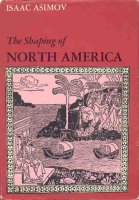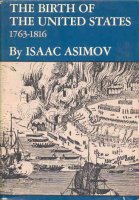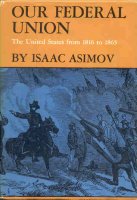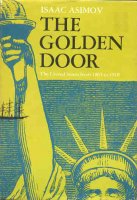



The Shaping of North America: From Earliest Times to 1763 by Isaac Asimov (Dobson, 1973)
The Birth of the United States: 1763 - 1816 by Isaac Asimov (Dobson, 1974)
Our Federal Union: The United States from 1816 to 1865 by Isaac Asimov (Dobson, 1975)
The Golden Door: The United States from 1865 to 1918 by Isaac Asimov (Dobson, 1977)
Isaac Asimov has always been one of my favorite writers, particularly of science fiction. As a child, I preferred my science fiction "hard"—with lots of plausible science and minimal fantasy—and Asimov, a biochemist, could always be counted on.
Later, I discovered his factual science writing, which if not as exciting was equally well-written and almost as compelling. I found that Asimov could expound on almost any topic, making it both interesting and understandable to the intelligent layman. It was with this in mind that I purchased, soon after they were first published, this series of books on American history. I knew even then that studying history was important, and I hoped that my favorite science writer could undo my school experience and make the subject interesting to me.
Alas, it was only time that finally healed that wound, and these books languished on my shelves for decades. I now find the study of history to be, not only important, but essential—especially in these days when ignorance and disregard of history appear to be growing exponentially. At last, I pulled Asimov's books down from the shelf, hoping for both my own edification and some history books I could recommend for our grandchildren.
The first goal was accomplished easily enough. I'm still impressed with Asimov's ability to start from the beginning and explain the basics of a subject without being condescending, a skill absolutly critical when appealing to bright young minds, and at which so many fail absymally when attempting to write for children.
I was so excited by the books that the only thing that kept me from passing them on immediately to our oldest grandchild was the desire to determine whether or not the author's autograph made the first book too valuable for casual use: To Linda, Isaac Asimov, 25 Sep '81. His comment at the time was, "I don't often get asked to autograph this series." True, the occasion was a gathering of science fiction enthusiasts, but of all the Asimov books I owned, these were the only ones I had in hardcover.
Sadly, no series has so failed of its promise to me since Harry Potter, which I felt peaked at the third or fourth book then went downhill dramatically. I waxed enthusiastic about these history books while I was still in the process of reading them (see How Far Have We Come in 200 Years? and The Art of Writing History). At the time, I wrote, "I highly recommend [this series] despite some obvious biases on the author's part (fairly mild, and unavoidable; that's why we need to read history from several sources). I still recommend it, but with serious qualifications.
Asimov's writing is interesting throughout, and he covers a lot of ground with almost as much thoroughness as could be expected from so broad a survey. I especially enjoyed his explanations of the historical origins of many common words and expressions, such as throwing one's hat in the ring, and gerrymandering.
However, as the series progressed, those author biases grew from mild to—well, perhaps not "Thai hot," but certainly too hot for my taste. When I said Asimov writes without condescension, that was not entirely correct. Of the merely ignorant he is respectful; but of those who disagree with his political and social viewpoints, not so much. For example, when he says of Grover Cleveland that "although a bachelor, he indulged in female company"—the kind of indulgence that resulted in an illegitimate child—he makes sure to add, "To expect anything else would have been ridiculous." A few such gratuitous insults are easily passed over, but as they grew numerous, with the political commentary more and more heavy-handed, reading became tedious.
I'm sorry to say that the series also fails of one more promise, the final sentence of the last book: How that came about will have to be the story of the next volume of this history of the United States. If Asimov ever wrote the final volumes of his series, I have yet to find them. It stops abruptly after World War I.
My recommendation has gone from wildly enthusiastic to lukewarm. These are useful histories, as long as one keeps in mind that they're told from a restricted viewpoint. I'm still looking for authors who can write compelling narratives without including a heavy bias in favor of themselves as the ultimate source of wisdom.


